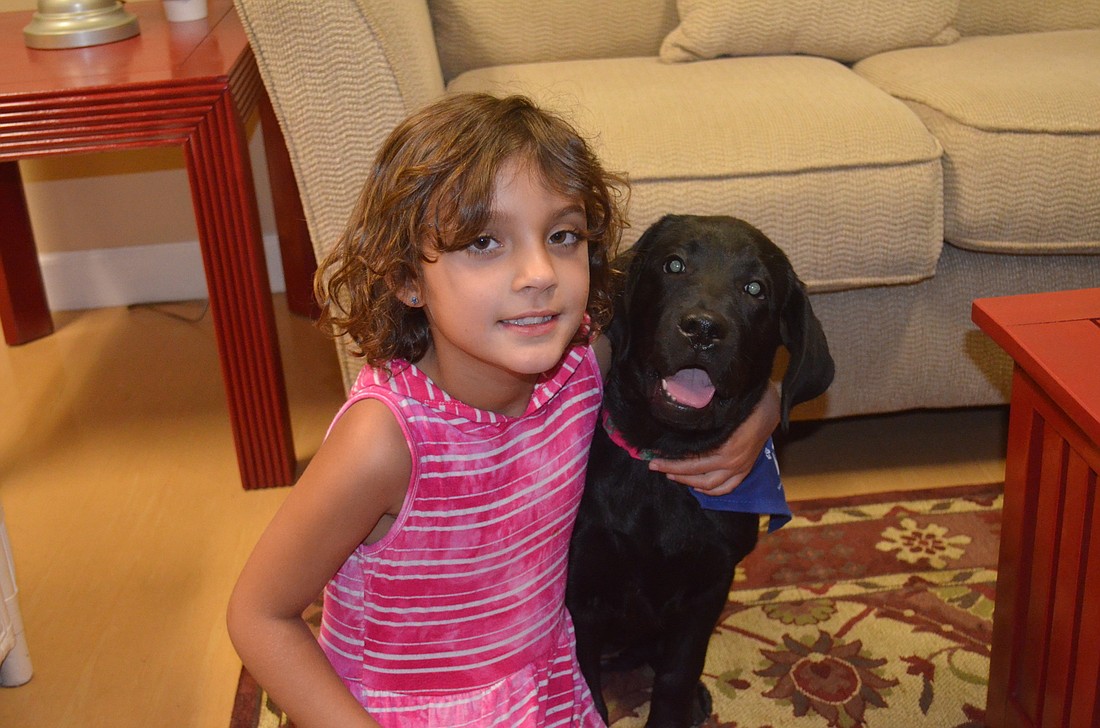- April 15, 2024
-
-
Loading

Loading

Like most four-month-old puppies, Sandy, a black Labrador, can’t keep her teething mouth away from anything.
“No,” Kristen Lessig, Sandy’s puppy raiser, repeatedly tells the dog as she tries to chew on a table.
Unlike most puppies, however, Sandy isn’t being raised to become a typical house dog; she is being raised to eventually benefit someone’s life. She is a future Southeastern Guide Dog.
Sandy’s story began last Thanksgiving on Longboat Key, when the island’s congregations decided to raise $5,000 to sponsor a Southeastern Guide Dog.
“We just thought it would be a wonderful way to come together to address this need, and we thought the name Sandy was one we could all identify with,” Rabbi Jonathan Katz, of Temple Beth Israel, said.
When the congregations raised enough money, they were assigned to Sandy, who was born May 21. The puppy’s raisers live in Anna Maria Island but plan to take Sandy to see her sponsors.
Kristen Lessig became involved with Southeastern Guide Dogs last year when her family moved from Virginia. In Virginia, she founded Sportable, a non-profit that helps people with disabilities play sports, and she wanted to become involved with another charity here. She worked for Southeastern Guide Dogs for several months. She later became executive director of the Anna Maria Island Community Center, but she still wanted to help Southeastern Guide Dogs.
“This organization does such wonderful things, and I knew I wanted to keep supporting it,” Lessig said. “We were ready to have another friend, so we decided to puppy raise.”
Kristen Lessing, along with her husband, Kyle, and 6-year-old daughter, Madeline, took Sandy home on Aug. 29 and will raise her for 14 to 16 months.
“She is very sweet and loving and will make a great friend and companion for someone. As long as she’s helping someone in some way, I’m happy.” – Puppy raiser Kristen Lessig
Before deciding to become puppy raisers, the biggest concern for the Lessigs was if Madeline could handle giving Sandy up.
“To me, it’s good to learn the lesson of impermanence, and we’re teaching her how Sandy will help someone else,” Lessig said. “I think she understands that.”
The family is in charge of housebreaking her, teaching her basic commands and socializing her.
“She’s also being loved, which is a big part of the training,” Lessig said. “My favorite thing is really being able to expose her to things gradually. She is very calm and a quick learner. Seeing her progress is fun.”
Sandy goes with Lessig to the Anna Maria Island Community Center every day, where she is exposed to people of all ages.
In addition to teaching her basic skills, the Lessigs bring Sandy to regular meetings, where she is able to socialize with other future guide dogs, including Sandy’s sister, Annie.
“I love the meetings we go to,” Madeline Lessig said. “I get to see other dogs. It’s really fun.”
When Sandy’s 14 to 16 months with the Lessigs are finished, she will go back to Southeastern Guide Dogs for another six to 12 months, where she will learn 40 more commands. It is there that it is determined if she is fit to become a guide dog.
“We have to do a thorough evaluation,” Amber Watt, Southeastern Guide Dogs sponsorship specialist, said. “We see if they have what it takes.”
The evaluation will be medial, physical and mental. Sandy must have excellent hips, eyes and elbows and have a positive temper and personality.
Southeastern Guide Dogs breeds Labrador retrievers, golden retrievers and Goldadors, a cross between Labrador and golden retrievers.
Each year, there are 200 to 250 puppies that are trained through Southeastern Guide Dogs, and about 38% of those will become guide dogs. The dogs that are not well-suited to become guide dogs are evaluated for alternate careers, including becoming service dogs for veterans with post-traumatic stress disorder and working in law enforcement. Some will also go up for public adoption.
“Overall, I think she has the ability to become a guide dog,” Lessig said. “She is very sweet and loving and will make a great friend and companion for someone. As long as she’s helping someone in some way, I’m happy.”